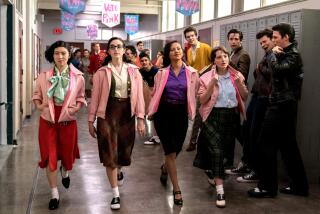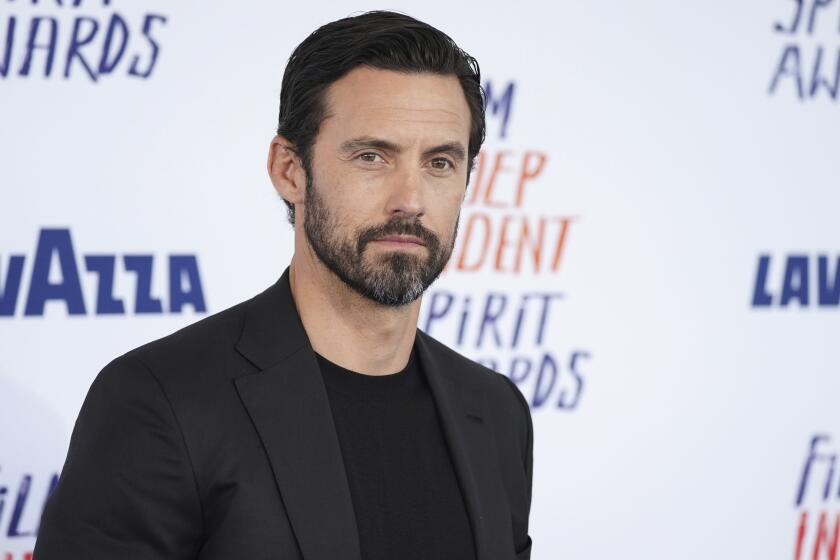‘Caesar’ Played the Game Before ‘Quiz’
- Share via
He’s encyclopedically well-read, possessed of more charm than money, and he intends to make a fortune on a TV quiz show, where he delights a national audience.
And he takes a dive in the process.
Name the movie.
Bzzzt --sorry, not “Quiz Show.”
Before Robert Redford and “Quiz Show,” even before Charles Van Doren and “Twenty-One”--the show that brought down television’s house-of-cue-cards corruption--there was Beauregard Bottomley.
In 1950, nearly a decade before Van Doren appalled the country by copping to his quiz-show sins, a movie ineptly titled “Champagne for Caesar,” starring Ronald Colman, made light of rigged quiz shows in a black-and-white satire that is virtually forgotten today--and shouldn’t be.
“Caesar,” which was directed by Richard Whorf from a script by Hans Jacoby and Fred Brady, is due for a comeback, a companion piece, a real-time concordance to “Quiz Show.” Remember the med-school cadaver class motto: The dead teach the living.
At the dawn of the Age of Television, a scholarly ne’er-do-well (master’s degree at 13) and his sister saunter forth from their bungalow-court flat in Los Angeles to watch a TV science program through the window of an appliance store. (This was during those few years when owning a TV was about as rare as owning an MX missile.)
The rest of the crowd wants to watch “Masquerade for Money,” a soap company’s quiz show whose costumed contestants answer questions put by goofball host Happy Hogan--Art Linkletter--for cash and a six-pack of Milady soap.
“This man is the forerunner of intellectual destruction in America,” intones Bottomley to the unimpressed folks outside the appliance store. “If it is noteworthy and rewarding to know that two and two make four, to the accompaniment of deafening applause and prizes, then two and two making four will become the top level of learning.”
The next day, when the chronically unemployed Bottomley applies for work at Milady Soap, he is snubbed by Milady’s president, Burnbridge Waters (Vincent Price, in a splendid comic turn--no, really), and decides to beat “Masquerade” at its own idiotic game.
Dressed as an encyclopedia, quiz-show contestant Bottomley, week upon week, unfailingly knows the eighth letter of the Greek alphabet, the second Ming emperor, the characteristics of upper Cretaceous deposits in Persia.
And he out-quips Happy Hogan, answering that “sayonara” is the Japanese word for goodby, “not to be confused with cyanide, which is goodby in any language.”
The public eats it up. Whole cities grind to a stop to watch or listen. Soap sales bloom. Fan clubs blossom. “There’s No Biz Like Quiz Biz,” blares Variety. Boffo Bottomley runs the stakes into the millions, for he intends nothing less than the takeover of Milady soap.
Waters, like the TV sachems of “Quiz Show,” had planned to wring Bottomley dry then dump him. But Waters has created a monster. Even canceling the show doesn’t work--soap sales plummet, so Bottomley is brought back.
Where Van Doren was seduced by fame and a check, Bottomley is seduced by revenge and--chastely, of course--by Flame O’Neil (Celeste Holm), hired by Waters to play Delilah to Bottomley’s quiz-kid Samson.
Her perturbing presence, intellectual and intoxicating (that high-flown vocabulary! those high heels!), drives Bottomley to well-bred distraction, but he tests her, and his doubts, by confiding that he hasn’t really nailed down Einstein’s space-time continuum.
Inevitably, the $20-million question, which Flame slips into Waters’ soap-scummy hand just before show time, is . . . the space-time continuum.
It gives us this scene, perhaps the best of the movie:
From onstage, Bottomley shoots a look at the perfidious Flame, and answers . . . erroneously. The nation gasps! $20 million, gone! Behind soundproof glass, Waters is ecstatic.
His phone rings. It is Princeton, Prof. Einstein calling. Bottomley was right. Waters passes out. Bottomley has, in fact, double-crossed Flame’s double-cross.
A week later, with $40 million and control of Milady Soap at stake in the Hollywood Bowl finale, Bottomley is asked the kind of question that always trips up the big ones: What is your Social Security number?
Like Ralph Fiennes’ Van Doren groping for the name of the King of Belgium, like John Turturro’s Herbert Stempel pretending to agonize over the best picture when he knows the answer is “Marty,” Bottomley too hems and haws theatrically . . . and blows it.
In a whimsically finessed finale of disarming ethical ambiguity, Bottomley and Flame--who loves him for himself, after all--head for Las Vegas in Bottomley’s new convertible.
It is his reward, along with his own radio show, stock and other perks, for agreeing to throw the game, whatever question they threw at him (although he makes out that it’s all right because it seems he really doesn’t know his Social Security number). Finis.
As I said, this film drags its maladroit title around like a set of manacles. “Caesar” is Bottomley’s eponymous parrot. It drinks; it prefers champagne. It appears in maybe five scenes. Even Mel Blanc’s voice cannot give this bird verve.
Yet the name cannot be the sole reason this movie was sent into the purgatory of 3 a.m. TV. Quirky satire has never been a red-blooded American pastime, and was perhaps especially rare and even perilous in the McCarthy era.
And in after-years, “Caesar’s” droll prescience may have doomed it for good. If the quiz-show scandals were indeed so wrenching, we could hardly be expected to muster enthusiasm for a whimsical film that made mock of our scandals before they even happened.
The Motion Picture Guide calls this “one of the funniest movies ever made.” If platform shoes can enjoy a revival, so can “Caesar.” (Please--a revival, not a remake.) After the scandal, after the movie about the scandal, it’s welcome fun. Truly--double or nothing.
More to Read
The complete guide to home viewing
Get Screen Gab for everything about the TV shows and streaming movies everyone’s talking about.
You may occasionally receive promotional content from the Los Angeles Times.







